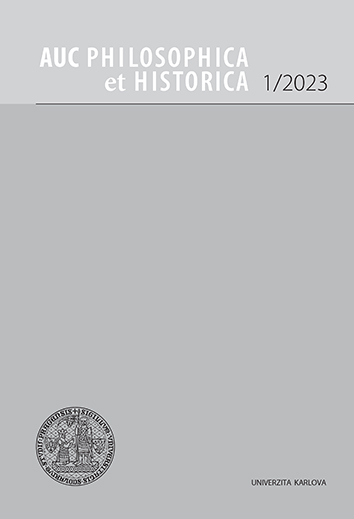AUC Philosophica et Historica je víceoborový akademický časopis zaměřený na humanitní a společenskovědné obory (filozofie, psychologie, pedagogika, sociologie, obecné, české a hospodářské dějiny, pomocné vědy historické a archivnictví, etnologie).
Časopis je indexován v databázích CEEOL, DOAJ a EBSCO.
AUC PHILOSOPHICA ET HISTORICA, Vol 1996 No 2 (1996), 61–83
K pojetí zločinnosti v hypermoderní společnosti
[On the Concept of Crime in Hyper-Modern Society]
Jiří Buriánek
DOI: https://doi.org/10.14712/24647055.2018.62
zveřejněno: 15. 01. 2018
Abstract
In the Czech Republic the growth in crime since 1989 (by 1993 an increase of more then 300%, followed by stabilization) has raised a series of questions recalling the recent „etiological crisis“ (J. Young) of world criminology. Growing public fears have been stimulating what are often not very well founded discussions on practical policies, and the question of the quality of the statistics is always in the background. The aim of our survey article is to place these debates in a worldwide context and to note the experience (and the errors) accumulated in the sociology of deviation over the last 25 years. In our view, constructivism is a useful concept here, despite the fact that it has acquired various different meanings in the course of development: 1. Methodological constructivism as one of the standpoints in the dispute over method in the 1960s (ethnomethodology, H. Becker, the critique of statistics from the standpoints of radical criminology). 2. The social engineering connected with practical policies for the control of crime (the confrontation between conservative and liberal conceptions is in the background). 3. The constructivism inspired by post-modern thought (reflexive criminology, new penology). The legacy of the constructivism of the 1960s includes important ideas on the social definition of deviation and the principles of marginalization, exclusion and labelling. The critique of statistics has shown itself to be problematic, especially with respect to research on victimization. This problem lends weight to realism (J. Young), emphasis on the empirical analysis of causes and strict evaluation of preventive programmes. Youngs postulate of a systems-structural approach, and concern for social dynamics and phenomena of social deprivation, are also welcome. Some of the conclusions of the author of the article on further directions and particular research projects are related to this theme. The ideas of conservative sociologists on the role of socialization and normative consensus should not be underestimated, and the question of repressive measures and punishment then deserves special care. When considering the possibilities for a more fundamental, if apparently in no way definitive solution to the problem of crime, we inevitably encounter the conception of modern society (M. Foucault). Postmodernism is in this context primarily a challenge to critical thought and the deepening of reflection. The new situation has been characterized by the concept of the risk society (U. Beck, A. Giddens), in which we see a changing approach to both prevention and punishment of crime. A new penology is emerging with the concept of actuarial justice (Fceley, Simon). The question of the effectiveness of punitive policy is posed. The attempt to gain a more profound understanding on the situation of criminology (T. Blomberg, S. Cohen, D. Mellossi) does not, of course, necessary entail a change in paradigm in the sense of the liquidation of the empirical basis of scientific understanding or an epistemological relativism. We see this, instead, as a mirror of practical policy. For this reason we also use the concept of the hyper-modern society and put the accent on the principle of reflexive thought: in the context of the ongoing modernization of Czech society, the attempt to modernize theoretical discourse, at least, is a pressing task and its importance should not be understated.
